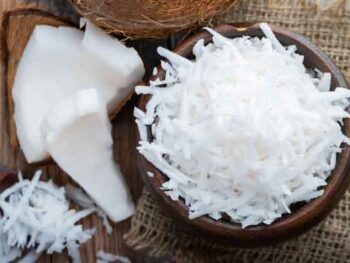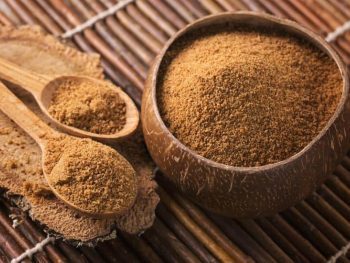
As people continue to shift toward healthier, more natural food choices, the demand for alternative sweeteners has exploded. While many are already familiar with coconut sugar, honey, and agave nectar, a new contender is gaining attention in the wellness and culinary world: coconut nectar.
Extracted from the sap of coconut blossoms, coconut nectar offers a natural, nutrient-rich, and sustainable alternative to traditional sweeteners. With its low glycemic impact, pleasant flavor, and versatility in recipes, coconut nectar is quickly becoming the next big thing in natural sweeteners.
In this article, we’ll explore what coconut nectar is, its nutritional benefits, how it compares to other sweeteners, and why it deserves a place in your pantry.
What Is Coconut Nectar?
Coconut nectar is a liquid sweetener made from the sap of coconut flower blossoms. Farmers tap the coconut blossoms and collect the sap, which is then gently heated to evaporate some of the water content—resulting in a thick, amber-colored syrup with a subtle, mildly sweet, caramel-like flavor.
Unlike refined sugars, which are heavily processed and stripped of nutrients, coconut nectar is minimally processed, retaining many of the natural vitamins, minerals, and enzymes present in the sap.
It is not the same as coconut water or coconut milk. Coconut nectar comes from the flower, not the fruit, making it a distinct and unique product with a growing reputation in health and culinary circles.
1. Naturally Low Glycemic Index

One of the standout benefits of coconut nectar is its low glycemic index (GI), typically around 35. The glycemic index measures how quickly a food raises blood sugar levels. For comparison:
- White sugar: GI 60–65
- Honey: GI 55–85
- Agave: GI 10–20 (but very high in fructose)
- Coconut nectar: GI ~35
This makes coconut nectar a better option for those trying to manage:
- Blood sugar levels
- Energy crashes
- Cravings
- Weight control
The low GI is largely due to its natural content of inulin, a type of soluble fiber that slows glucose absorption into the bloodstream.
2. Rich in Nutrients and Amino Acids
Unlike refined sweeteners, coconut nectar retains trace amounts of over 17 amino acids, along with vitamins B and C, and essential minerals such as:
- Potassium
- Magnesium
- Iron
- Zinc
- Calcium
These nutrients support a range of bodily functions, from energy metabolism and immune support to heart and bone health.
While you wouldn’t consume large amounts of coconut nectar just for nutrition, the presence of these micronutrients gives it an edge over nutrient-empty sweeteners like corn syrup and refined sugar.
3. Contains Prebiotic Fiber for Gut Health

One of the lesser-known benefits of coconut nectar is its content of inulin, a type of prebiotic fiber. Prebiotics act as food for probiotics—the good bacteria that live in your gut.
Including coconut nectar in your diet in moderation may help:
- Support digestion
- Improve nutrient absorption
- Strengthen immune function
As gut health continues to gain attention in the wellness community, sweeteners that offer digestive support are becoming increasingly attractive.
4. Environmentally Friendly and Sustainable
Coconut nectar is one of the most sustainable sweeteners available. Coconut trees:
- Require less water than sugarcane or corn
- Produce sap continuously for over 20 years
- Yield multiple products (nectar, sugar, oil, water)
Tapping the sap from coconut blossoms does not harm the tree, and because coconut palms grow in diverse ecosystems, they support biodiversity and soil health.
Consumers who care about the planet are turning to coconut nectar as a sweetener that aligns with eco-friendly values.
5. Suitable for a Wide Range of Diets
Coconut nectar is naturally:
- Vegan
- Gluten-free
- Dairy-free
- Non-GMO
- Paleo-friendly
It’s also free from artificial additives, preservatives, and chemicals, making it ideal for clean eating and whole-food-based diets.
Whether you're following a specific meal plan or simply looking for better ingredients, coconut nectar fits easily into most dietary lifestyles.
6. Versatile in Cooking and Baking

Coconut nectar has a smooth, mild, and slightly tangy flavor, similar to light molasses or maple syrup. It adds a pleasant depth to recipes without overpowering them, and it works in both sweet and savory dishes.
Ways to Use Coconut Nectar:
- Drizzle over pancakes, oatmeal, or yogurt
- Stir into tea or coffee
- Use in smoothies or protein shakes
- Bake into cookies, cakes, and granola bars
- Add to marinades, salad dressings, and glazes
- Sweeten dairy-free ice cream or sauces
Baking Tip:
You can substitute coconut nectar 1:1 for honey or agave in most recipes. In baking, you may need to slightly reduce other liquid ingredients to maintain proper consistency.
7. Better Tolerated Than Some Other Sweeteners
Many natural sweeteners—like stevia and monk fruit—can have a noticeable aftertaste or may cause digestive issues in some people. Coconut nectar has a more neutral flavor and is less likely to trigger bloating or discomfort when used in moderation.
Its mild taste and gentle effect on digestion make it a preferred choice for sensitive individuals, including children and those with food intolerances.
8. Clean Label and Minimal Processing
As consumers become more label-conscious, clean ingredients with simple, recognizable names are taking over the market. Coconut nectar is usually listed as:
“Organic Coconut Blossom Nectar”
That’s it—no added sugars, no coloring, no syrups. This transparency appeals to shoppers who want to avoid the hidden sugars and chemicals often found in processed foods.
9. Growing Popularity Among Food Brands
Many health-conscious brands are beginning to use coconut nectar as a natural sweetener in packaged goods, including:
- Protein bars
- Non-dairy yogurts
- Vegan baked goods
- Condiments
- Energy drinks
This growing presence in commercial products is helping boost coconut nectar’s visibility and affordability, making it more accessible to everyday consumers.
10. A Sweet Future Ahead
With the combination of health benefits, environmental sustainability, culinary versatility, and growing market demand, coconut nectar is well on its way to becoming a mainstream natural sweetener.
As consumers continue to question what’s in their food and how it affects both their bodies and the planet, coconut nectar’s appeal will likely continue to rise.
Conclusion: A Smart and Sweet Upgrade
Coconut nectar is more than just a trendy sweetener—it’s a nutrient-rich, low-GI, eco-friendly syrup that brings value to your plate without compromising health or flavor. Whether you’re baking, blending, or drizzling, coconut nectar provides a wholesome alternative to traditional sugar and artificial syrups.
If you're looking to make smarter, cleaner choices in the kitchen, coconut nectar is a delicious and forward-thinking option worth exploring.



